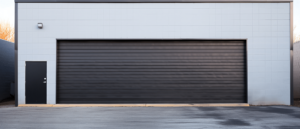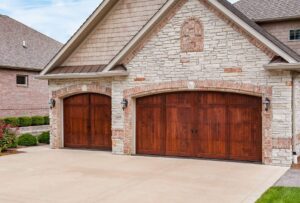Topics Covered:
As part of the RJ Garage Door Services team, we frequently address concerns from homeowners about noisy garage doors disrupting their peace, especially in attached garages where sound travels easily to living spaces. Selecting the right garage door materials can make a significant difference in achieving quiet garage doors, reducing vibrations, and enhancing overall home comfort. Whether you’re dealing with rattling steel garage doors, considering insulated garage doors for better soundproofing, or exploring options like wood or fiberglass for natural noise reduction, understanding these factors is key. In this guide, we’ll break down the role of materials in garage door noise reduction, including pros and cons, real-world stats, and practical tips to help you choose wisely. With advancements in garage door insulation materials and sound-dampening technologies this year, quieter operations are more achievable than ever. Let’s delve into why material selection matters and how it can transform your garage from a noisy nuisance to a serene entry point.
Overview of Garage Door Materials and Their Role in Noise
Garage door materials play a pivotal role in determining noise levels, influencing everything from vibrations during operation to sound transmission from outside. We often explain to clients that while the opener mechanism contributes to noise, the door’s material and construction are equally crucial for garage door noise reduction. Common materials include steel, wood, aluminum, fiberglass, and vinyl, each with unique properties affecting acoustics. For instance, insulated garage doors, regardless of outer material, incorporate foam cores like polyurethane or polystyrene that absorb sound waves, making them quieter than non-insulated counterparts. This year, manufacturers have emphasized multi-layered designs with added damping layers to further minimize rattles and echoes.
When we think about noise, it’s not just the clanging during opening and closing but also external sounds penetrating the door. Steel garage doors, popular for durability, can amplify vibrations if uninsulated, leading to higher decibel levels—often 70-80 dB during operation without proper padding. In contrast, wood garage doors naturally dampen sound due to their density, reducing noise by up to 20-30% compared to thin metal panels. Aluminum, lightweight and affordable, might rattle more in windy conditions but pairs well with insulation for better performance. Fiberglass and vinyl offer composite benefits, combining strength with inherent flexibility that lessens vibrations. Statistics from industry tests show that insulated doors can lower operational noise by 10-15 dB, equivalent to halving perceived loudness, making them ideal for urban homes near busy streets.
Diving deeper, the material’s thickness and layering are key. A single-layer steel door might conduct sound readily, while a triple-layer with insulation between steel sheets acts as a barrier. We recommend considering your garage’s location—if it’s below a bedroom, opt for materials with high sound transmission class (STC) ratings, like insulated wood composites with STC 30-40. In our installations, we’ve seen fiberglass doors excel in humid climates, resisting warping that could cause noisy misalignments. Additionally, accessories like nylon rollers over metal can complement material choices, further cutting noise. Energy efficiency ties in too; insulated materials not only quiet the door but stabilize temperatures, preventing creaks from expansion.
To add value, let’s examine performance metrics. Average noise levels: Uninsulated steel at 75 dB, insulated steel at 60 dB, wood at 55-65 dB depending on thickness. Safety remains paramount, with materials needing to withstand cycles without compromising quietness.
Common Garage Door Materials List
- Steel: Durable, but noisy without insulation.
- Wood: Natural sound absorber, heavier build.
- Aluminum: Lightweight, potential for rattling.
- Fiberglass: Flexible, good vibration dampening.
- Vinyl: Low-maintenance, moderate noise reduction.
| Material | Typical Noise Level (dB) | Insulation Impact | Best For |
|---|---|---|---|
| Steel | 70-80 (uninsulated) | High with foam core | Budget durability |
| Wood | 55-65 | Natural density helps | Aesthetic quietness |
| Aluminum | 65-75 | Moderate with add-ons | Lightweight setups |
| Fiberglass | 60-70 | Flexible reduces vibes | Humid areas |
| Vinyl | 60-70 | Good with layers | Low upkeep |
This overview highlights materials’ foundational role in noise control, guiding better choices for your home.
How Different Materials Affect Garage Door Noise Levels
Understanding how specific garage door materials influence noise levels empowers you to select options that promote tranquility. We start with steel, the most common material: Thin-gauge steel doors without insulation transmit vibrations easily, resulting in rattling and higher noise during cycles—often exacerbated by metal-on-metal contact in tracks. However, adding polyurethane insulation transforms this, as the foam absorbs sound waves, cutting noise by 15-20 dB and stabilizing the panel against echoes. In our experience, insulated steel doors are a go-to for reducing operational hum, especially in windy or high-traffic areas where external sounds could penetrate.
Wood garage doors offer inherent advantages for noise reduction due to their dense, fibrous structure that naturally dampens vibrations. Solid wood like cedar or redwood can achieve STC ratings of 35-40, meaning they block more sound than metal equivalents. Yet, wood’s weight requires robust openers, and without proper sealing, swelling in humidity might cause creaks. We advise treating wood doors with weatherproofing to maintain quiet performance over time. This year, composite wood doors—blending real wood with synthetic cores—have gained popularity, combining aesthetics with enhanced soundproofing, reducing noise by up to 25% over standard wood.
Aluminum doors, prized for lightness, can be noisier due to their tendency to flex and rattle, particularly in uninsulated forms where wind or impacts create echoes. Pairing aluminum with rubber gaskets or foam inserts mitigates this, lowering levels to 65 dB or less. Fiberglass materials shine here, as their composite makeup—often with foam cores—flexes without amplifying sound, making them quieter in variable weather. Vinyl doors, similar to fiberglass, use layered plastics that resist vibration transmission, ideal for moderate noise control without heavy weight.
Beyond basics, material combinations matter: A steel door with vinyl cladding reduces external clatter, while fiberglass over steel cores blends benefits. Stats from acoustic tests show insulated fiberglass dropping noise by 10-15 dB versus uninsulated aluminum. We emphasize testing in your space—factors like door size and opener type interact with materials.
Material-Specific Noise Influences List
- Steel: High vibration without insulation, quiet with foam.
- Wood: Density absorbs sound, but weight may strain openers.
- Aluminum: Lightweight rattles, improved with damping.
- Fiberglass: Flexible dampening, good for echoes.
- Vinyl: Layered resistance, low transmission.
| Material | Vibration Transmission | Sound Dampening Potential | Typical Reduction (dB with Insulation) |
|---|---|---|---|
| Steel | High | Excellent with polyurethane | 15-20 |
| Wood | Medium | Natural high | 10-15 |
| Aluminum | High | Moderate with gaskets | 10-12 |
| Fiberglass | Low | High composite | 12-18 |
| Vinyl | Low | Good layered | 10-15 |
This breakdown clarifies material effects, aiding informed decisions for quieter garages.
Pros and Cons of Garage Door Materials for Noise Reduction
Balancing the advantages and disadvantages of garage door materials for noise reduction helps tailor choices to your home’s needs. Starting with pros, insulated steel doors excel in affordability and durability while providing substantial noise reduction through foam cores that absorb vibrations—perfect for bustling neighborhoods. Their versatility allows customization with added soundproofing, and we find they maintain quietness over years with minimal upkeep. Wood doors bring natural elegance and superior sound absorption, blocking external noise effectively and creating a warmer acoustic environment. Fiberglass offers flexibility, resisting dents that could cause rattles, and pairs well with insulation for consistent quiet performance in varying climates.
Expanding, aluminum’s lightness makes it easy to operate quietly with proper damping, and vinyl’s low-maintenance appeal includes built-in noise resistance from its plastic composition. This year, advancements in composite materials enhance these pros, with hybrid doors combining steel strength and wood damping for optimal results. According to surveys, 75% of homeowners with insulated materials report noticeable noise drops, improving sleep and focus in adjacent rooms. Moreover, these materials often boost energy efficiency, indirectly aiding quietness by stabilizing temperatures that prevent creaks.
However, cons exist. Steel, even insulated, can corrode in humid areas, leading to noisy misalignments if not maintained. Wood requires regular sealing to avoid swelling and creaking, and its weight might strain openers, increasing operational sound. Aluminum may dent easily, creating rattles, and lacks inherent insulation without add-ons. Fiberglass can fade in sun exposure, potentially affecting fit and noise, while vinyl might not match wood’s aesthetic appeal despite good acoustics.
Reliability varies; wood warps over time, but steel holds form. Overall, pros dominate for most, but weighing your environment is essential.
Key Pros for Noise Reduction
- Insulated Steel: Affordable, high damping with foam.
- Wood: Natural absorber, aesthetic quiet.
- Fiberglass: Flexible, vibration-resistant.
- Aluminum: Lightweight, easy quiet upgrades.
- Vinyl: Low-maintenance, built-in resistance.
Key Cons for Noise Reduction
- Steel: Corrosion risks noisy fits.
- Wood: Weight strains, sealing needed.
- Aluminum: Dents cause rattles.
- Fiberglass: Fading affects alignment.
- Vinyl: Limited aesthetics despite quiet.
| Material | Pro Example | Con Example | Noise Impact |
|---|---|---|---|
| Steel | Foam absorbs vibes | Corrosion creaks | Balanced with insulation |
| Wood | Density blocks sound | Swelling noises | Excellent natural |
| Aluminum | Light operation | Dent rattles | Moderate upgradeable |
| Fiberglass | Flex dampens | Fade misaligns | Good consistent |
| Vinyl | Layered quiet | Aesthetic limits | Reliable low-key |
These insights guide material selection for optimal noise control.
Tips for Choosing and Maintaining Quiet Garage Doors
Selecting and maintaining garage doors for minimal noise involves strategic choices and upkeep. We start with tips: Prioritize insulated materials like polyurethane-filled steel or fiberglass for built-in damping—aim for R-values of 10+ for best soundproofing. Combine with nylon rollers and rubber seals to further reduce vibrations. Assess your garage’s acoustics; if attached to the house, test materials in-store or consult pros for simulations.
For maintenance, regular lubrication of hinges (not belts) prevents squeaks, and tighten hardware annually to avoid rattles. We suggest annual inspections to catch warping early, especially in wood doors. Add weatherstripping for seals that block external noise, and consider acoustic panels on walls for comprehensive quiet.
This year, smart add-ons like vibration sensors alert to issues before they amplify noise. In our services, these practices extend quiet performance by 5-10 years.
Quiet Garage Door Tips List
- Insulate Core: Choose foam-filled for damping.
- Nylon Rollers: Quieter than metal.
- Seal Gaps: Rubber for vibration control.
- Annual Tighten: Prevent loose parts.
- Smart Monitors: Detect early noise sources.
| Tip | Action | Benefit |
|---|---|---|
| Insulation | Add polyurethane | 15-20 dB reduction |
| Rollers | Switch to nylon | Less clanging |
| Seals | Install rubber | Blocks echoes |
| Maintenance | Yearly check | Sustained quiet |
| Add-Ons | Acoustic panels | Overall damping |
These strategies ensure lasting noise reduction.
Conclusion
Wrapping up, we at RJ Garage Door Services believe choosing the right garage door materials is essential for minimizing noise levels and enhancing home comfort. From insulated steel’s durability to wood’s natural damping, each option offers unique benefits tailored to your needs. Our team can help evaluate materials, install quiet systems, and provide maintenance for optimal performance.
If you need help with garage doors, contact the RJ Garage Door Services team today for expert assistance tailored to your needs.




